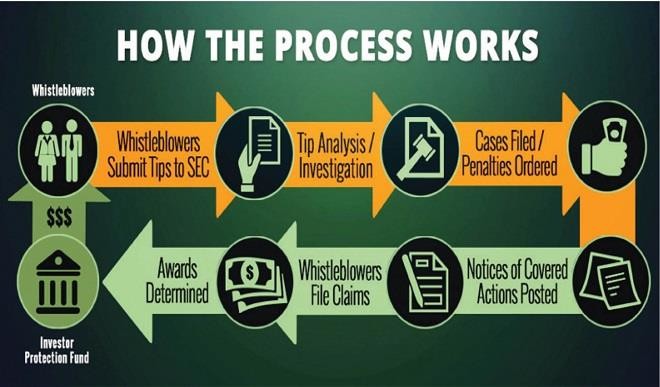
The whistle blower has been granted an elevated status in our society. He is to be rewarded for blowing the whistle on those who abuse public trust. This is the first official recognition of the whistle blower and his role in keeping public morality on the straight and narrow path. The idea is to encourage minions to rat on their thieving ogas at the top. It is an interesting development in our long-running anti-graft war. EFCC can now rely on whistle blowers to track thieves in high places to where they hide their loot. How truly interesting!
Should our editors and reporters be happy about this changed status of the whistle blower? The answer would be clear as we examine the whistle blowing phenomenon. But nothing is going to really change. The whistle blower would still remain anonymous and ply his trade in utter secrecy. The nature of his mission makes that both wise and necessary.
Whistle blowing is a high risk self-imposed mission. It often invites drastic and even murderous reprisals from those who fall into the gutter at the blast of the whistle. They do not look kindly on those who rubbish their well-cultivated, clean public image. They would do anything to protect it and keep it as it is. The whistle blower is, obviously, an enemy.
Whistle blowing is a citizen mission. The phenomenon must have arisen from the desire of citizens at the bottom of the ladder who abhorred the itchy fingers of their immediate bosses and took the risk of exposing them. Men and women are generally steeped in the missionary zeal to do well by their society.
The whistle blower is an important but anonymous personage in all societies. He has been with us since men and woman learnt to value the exchange of information outside official sources. We can see him either as a typical nosey poker who does not endear himself to men and women who value their secrets and prefer to keep them hidden even in unlikely places; or we can see him as a public do-gooder whose mission is to help society cleanse itself of some cleansable vermin. Officialdom traditionally treats him with contempt as a busybody – an Amebo.
Whatever officialdom may think of him, the whistle blower is an invaluable source of information for editors and reporters. They cultivate him because without him, investigative reporting would be impossible. He is the great unnamed authority clothed with such endearing and respectable labels as an informed source, a reliable source, a knowledgeable source, a dependable source, an authoritative source, etc.
He was the Deep Throat in the Watergate scandal. Bob Woodward and Carl Bernstein’s investigative reporting shook the earth. Their relentless commitment to get at the truth redefined investigative reporting and clothed the whistle blower with a new aura and journalism with new power. Their work remains a challenge to generations of reporters and editors wherever men and women value truth and the public good. Bob and Carl would have gone nowhere without Deep Throat. The whistle blower enjoys a protected status in the news media. An editor would rather go to prison than name his whistle blower, the source of his story.
What motivates the whistle blower? Is he motivated by altruism and the public good? Tricky questions. Not everything is as it looks. There is some evidence that the whistle blower is motivated by the desire to be of moral service to his society. But it is also quite possible for a whistle blower to be motivated by revenge. The oga or someone who has treated us like a nobody must, if the opportunity arises, pay for maltreating us. In this scenario the whistle blower thinks much less of the public good but more of payback time.
Editors are no strangers to whistle blowers who hawk incriminating documents for money. In this case, the whistle blower is motivated by the desire to benefit from another’s criminality. Not many editors resist the temptation to pay a whistle blower for his documents. There is nothing genuine or altruistic in the conduct of a whistle blower who hawks his information and is prepared to sell it to the highest bidder.
The ambition to earn something on the side often forces some whistle blowers to resort to forgeries and fabrications. Many an unwary editor would tell what harm this sort of whistle blowing has done to the reputation of their newspapers. Libel is always a present danger when an editor treats the whistle blower as the only authoritative source of sensitive information.
Part of our problem is that editors do not usually inquire into the motive of a whistle blower. It is an acceptable principle that it is unethical to question the motive of a news source. It is the quickest way to lose a news source. His motive may be noble or ignoble. No matter. We do business with him.
An editor’s professional ambition to scoop other editors may make him ignore the necessary care and caution and accept the whistle blower as an anointed man of God. This poses some nasty problems, the full facts of which would confront an editor when the be-wigged and the be-gowned men expose his patent lack of professional caution in treating the information from the whistle blower as unquestionable gospel truth.
An editor owes it to himself to cross check the information he receives from a whistle blower. It is professionally wrong to treat such information as sacred. No one is perfect. The whistle blower is not perfect. After all, he steals from others to expose others.
With rewards formally attached to whistle blowing, we should expect the emergence of a crowd of do-gooders. This sign should find a prominent place in every editor’s office: WE DO NOT TREAT INFORMATION FROM THE WHISTLE BLOWER AS SACRED.

 Join Daily Trust WhatsApp Community For Quick Access To News and Happenings Around You.
Join Daily Trust WhatsApp Community For Quick Access To News and Happenings Around You.


